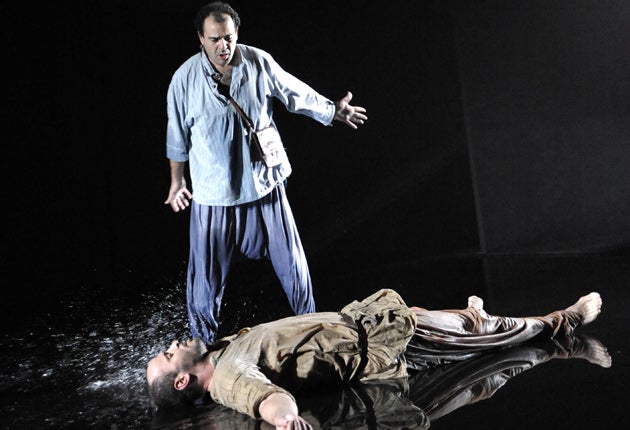I Am Yusuf and This Is My Brother, Young Vic, London

Your support helps us to tell the story
From reproductive rights to climate change to Big Tech, The Independent is on the ground when the story is developing. Whether it's investigating the financials of Elon Musk's pro-Trump PAC or producing our latest documentary, 'The A Word', which shines a light on the American women fighting for reproductive rights, we know how important it is to parse out the facts from the messaging.
At such a critical moment in US history, we need reporters on the ground. Your donation allows us to keep sending journalists to speak to both sides of the story.
The Independent is trusted by Americans across the entire political spectrum. And unlike many other quality news outlets, we choose not to lock Americans out of our reporting and analysis with paywalls. We believe quality journalism should be available to everyone, paid for by those who can afford it.
Your support makes all the difference.In the late 1990s, the Royal Court's excellent international department dispatched David Hare to Israel, where they hoped he would research a play about the circumstances of the end of the British Mandate in Palestine in 1948 and the disastrous consequences of the partition vote by the United Nations.
He emerged from his experiences out there with something rather different – the celebrated monologue Via Dolorosa, a powerful and highly personal piece. If you felt in the mood to be satirical, you could argue that he explored the ways in which the Arab/Israel crisis is a metaphor for the difficulties of being a David Hare type of playwright in a world where, back then at any rate, the moral stakes seemed dispiritingly low.
Belatedly but most beautifully, a drama about the appalling tensions of 1948 is being presented now at the Young Vic, a theatre which is, admirably, a creative collaborator in the project as well as its host. I Am Yusuf and This Is My Brother is written and directed by the Palestinian author Amir Nizar Zuabi and is brought to London by his inspiring new company, ShiberHur, a name which means "inch of freedom" and betokens the desire on the part of Palestinian artists to find a space for the unfettered imagination.
The piece is very different from the doubtless equally valid neo-Shavian debate play that Hare might have written. From the perspective of Ramallah in the year 2000 and a modern intifada and with a touching/surreal framing-device of the protagonists now in retrospective old age, the play leaps back to 1948 and tracks the mounting confusion, alarm and misery as Britain wriggles out. But here it's a matter of feeling the political effect on the pulses of the characters as well as in their synapses. The mode of the piece encompasses shrewdly revealing shifts of plot and a whole poetic dimension that unlocks what is happening deep in the soul of the dispossessed.
The central protagonists are the eponymous siblings. For reasons that only painfully emerge late on, Yusuf is thought of as the village simpleton. Wrongly regarded as a genetic liability, he is why Nada's father opposes her romance with Yusuf's brother, Ali. There is a repeated pattern of emotional errors exacerbated by the regime change. Later, for example, Nada wrongly assumes that her father was killed in a revenge attack by Ali's family; in fact, it's because he was a collaborator with the invaders.
At the same time as these intricate skeins are being woven, Zuabi's superb piece keeps taking lyrical flight. In a manner that in the British tradition would remind you of the emblematic figures in The Pilgrim's Progress, the dilemmas and the dubieties of dispossession are symbolised by a figure who wanders about with an entire tree on his head. It will either kill him or he will kill it, but he can't bear the idea of it shading or feeding the occupiers of his old home. That conceit has profound poetic resonance as does much of the excellent script (delivered mostly in English). There's a pot-bearing female chorus. It's as though the Caryl Churchill who wrote Far Away has had a hand in the strand of imagery which spreads the sense of there being a fight on into the very means whereby life might be sustained: "the wheat sheaves fight against their ripeness and the hard-working ants... "
Performed on a rust-red set where sacking is hoisted into various suggestive shapes by pulleys, this is the kind of show by an oppressed, resilient people that can sometimes receive reviews where the phrase "triumph of the human spirit" is a euphemism for "artistically dodgy". No need for that cant here.
To 6 February (020 7922 2922)
Join our commenting forum
Join thought-provoking conversations, follow other Independent readers and see their replies
Comments